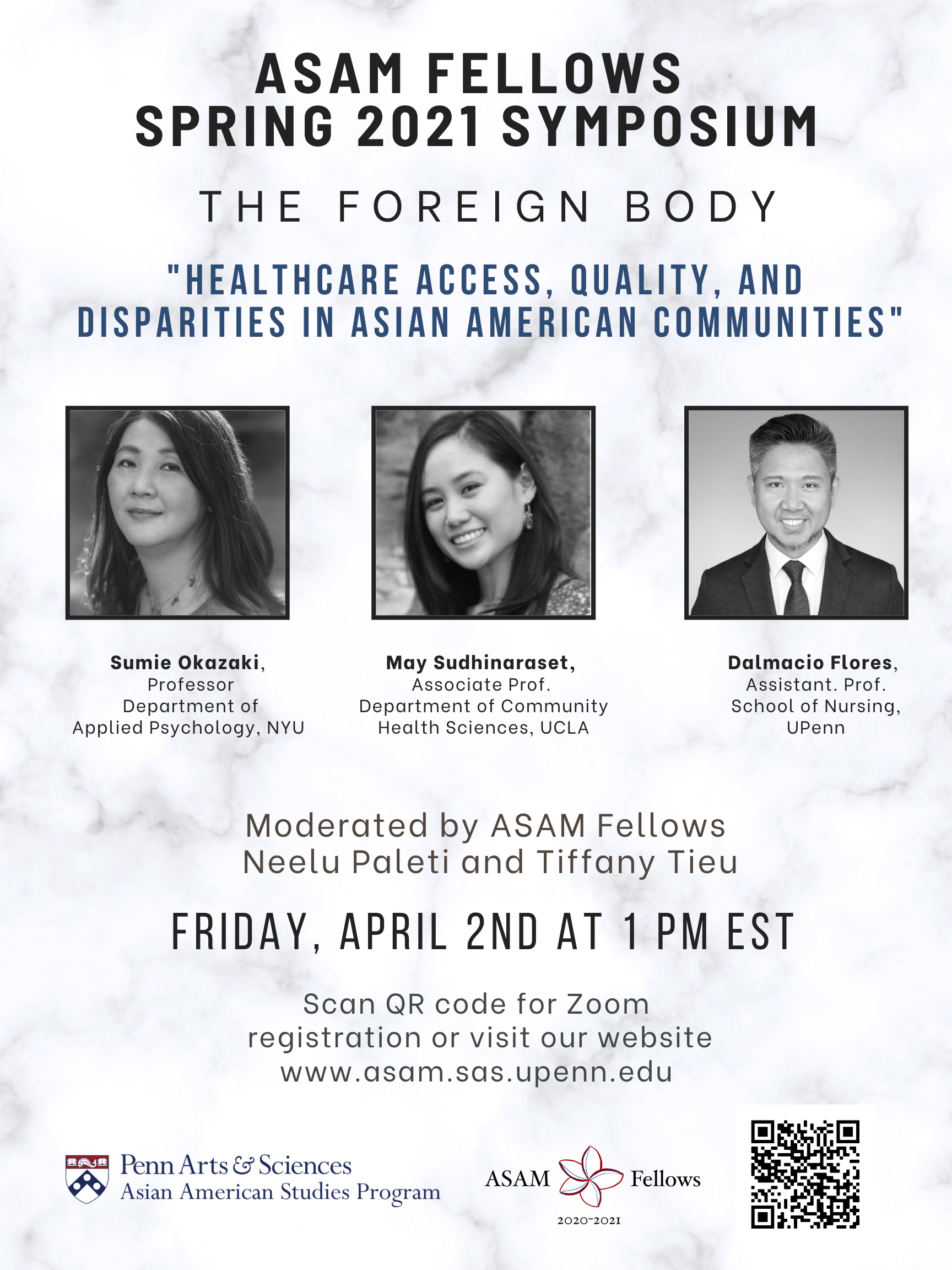Event

ASAM Fellows Spring 2021 Symposium: "The Foreign Body" presents: "A conversation on healthcare access, quality, and disparities in Asian American communities."
Panelists:
Dalmacio Flores, Ph.D. ACRN is an Assistant Professor at the University of Pennsylvania School of Nursing and is a Visiting Professor at the Center for Research on AIDS at Yale University’s School of Public Health. He has led several studies that investigate the role of parents in the sexual health education of their adolescent sons who identify as gay, bisexual, and queer (GBQ). His current research examines how family dynamics within AAPI families impact the sexual identity milestones of LGBTQ+ Asian Americans and their formative experiences with sexual health access and use. With an awareness of the personal and contextual factors that increase sexual minority populations’ vulnerability for HIV/STI infection and poor care-related outcomes, the first study Dr. Flores led investigated the conditions that contributed to the recent HIV infection of young gay men in Atlanta. That study has fueled his subsequent HIV prevention work that includes both urban and rural community education, being a national spokesperson for HIV testing campaigns, and workforce development with around 1200 nurses across three continents. His commitment to HIV/AIDS care and leadership throughout his career includes serving in various leadership roles for the Association of Nurses in AIDS Care. Dr. Flores earned his Ph.D. from Duke University, a Master’s in Public Health Nursing Leadership at Emory University, and a Bachelors in Nursing from Kennesaw State University in GA.”
Sumie Okazaki, PhD, Professor, Applied Psychology Chair, Department of Applied Psychology at NYU Steinhardt School of Culture, Education, & Human Development. Selection Committee for the W.T. Grant Foundation Institutional Challenge Grant. Okazaki conducts research on the impact of immigration, social and culture change, and race on Asian and Asian American adolescents, emerging adults, and parents within local and transnational contexts. With colleagues in anthropology, education, and developmental psychology as well as community partners, she has ongoing research projects with urban Chinese American adolescents and immigrant young adults in New York City; Chinese parents and adolescents in Shanghai and Nanjing, China; Korean American and Filipino American adolescents and parents in Chicago; and current and former Korean early study abroad students in New York City, the Philippines, and South Korea. Her most recent book, co-authored with Nancy Abelmann, is titled Korean American Families in Immigrant America: How Teens and Parents Navigate Race (NYU Press, 2018).
May Sudhinaraset, PhD, Associate Professor, Department of Community Health Sciences Jonathan and Karin Fielding School of Public Health, University of California, Los Angeles (UCLA). Her primary area of research is examining the health equity of marginalized populations, including women, children, and migrants both globally and in the US. Sudhinaraset is a social epidemiologist, focused on community-based participatory approaches to research. Her experiences have spanned domestic and global settings and include: 1) assessing the impact of social policies on reducing racial/ethnic health inequities; 2) reproductive rights and quality of maternity care, contraception, and abortion services; and 3) evaluations of maternal and child health interventions. Currently, Sudhinaraset is Principal Investigator of the BRAVE Study (Bridging communities Raising API Voices for health Equity), the first study to examine the health status and health care utilization of undocumented Asian and Pacific Islander young adults. Using a community-based participatory approach, this mixed-methods study assesses the impact of social policies, including Deferred Action for Childhood Arrivals, on health outcomes. She also works with national reproductive justice organizations to examine how social policies may impact the health of immigrant women and women of color. Additionally, she leads a large study in Kenya and India to improve respectful care and person-centered reproductive healthcare among low-income women. In 2019, She was named a Changemaker in Family Planning by the Society of Family Planning.
Moderators:
Tiffany Tieu is a junior from Cheltenham, Pennsylvania studying psychology. She holds research positions at Penn Medicine and the DeRubeis Lab. As a member of the College Cognoscenti, Tiffany gives weekly presentations about the College of Arts and Sciences to prospective students. She is also involved in the Peer Advising Program, Research Peer Advising Program, and Alpha Phi Omega. She is interested in minority mental health and improving the lives of those struggling with mental illness. Tiffany has conducted research on mental health in the Asian community and hopes to build upon her work through the ASAM Fellows Program.
Neelu Paleti, Neelu is a rising senior from Dublin, OH studying Health and Societies to pursue her interests in health policy and global health. At Penn, she serves as the Director of Operations of Service Link, and she is actively working with Universities Allied for Essential Medicines, Penn Healthcare Review, and the Center for Healthcare Innovation. Neelu is fascinated by the intersections of sociopolitical factors and health outcomes, and she hopes to further explore these connections through her research on the rising rates of c-section deliveries and the implications on agency, class, and power in South Indian and Asian American populations.
This 2020-2021 Asian American Studies program hosted its inaugural cohort of ASAM Fellows. Each Fellow conducted independent research projects over the summer that related to Asian American Studies, with a recurring theme of “The Foreign Body.” Together, their works question the meaning of foreign bodies as they exist in the U.S. and what this signifies for Asian Americans, examining instances in which the Asian American body has been misrepresented and underrepresented, constantly surveilled, and defined in contrast to whiteness. In the fall, each ASAM Fellow presented their research during the ASAM Fellows Colloquium, and this Spring, ASAM is hosting a Conference, which examines how the state and greater geopolitical forces have politicized and controlled the foreign body: the Asian American body.
